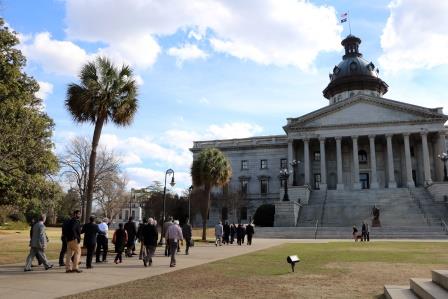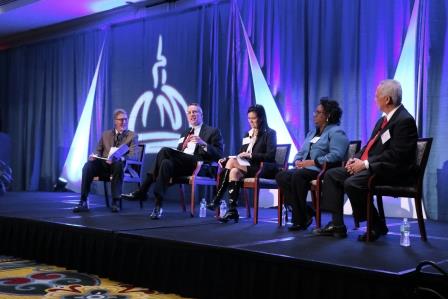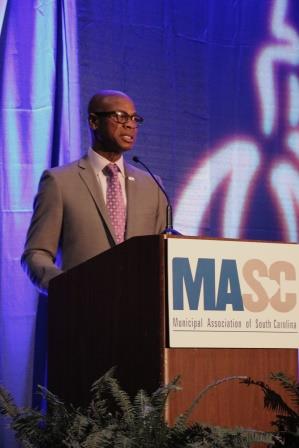The 2017 Hometown Legislative Action Day put legislators and state agency directors in front of local officials to bring state perspectives to issues important to local governments.

HLAD attendees from South Carolina’s cities
and towns walked to the State House to meet with their legislators.
The goal: revenue-neutral tax changes
A House ad hoc committee has been looking at the state’s tax system since the summer. The House Tax Policy Review Committee is studying the state tax code and submitting suggestions for reform to the House speaker. “Any money we would capture would be used to reduce rates,” said Rep. Tommy Pope of York County, who chairs the committee.

Lexington Mayor Steve MacDougall moderated an HLAD panel of House members who serve on the House Tax Policy Review Committee, Representatives Tommy Pope of York County, Mandy Powers Norrell of Lancaster County, Chandra Dillard of Greenville County and Joe Daning of Berkeley County.
Pope and other members explained the delicate nature of trying to eliminate any of the dozens of sales tax exemptions.
One idea that was floated as an exercise — to start from zero exemptions and work backward — drew a warning from at least one lobbyist, recalled Pope. “He said, ‘If you even do this as a case study, all the businesses are leaving,’” said the committee chairman.
Rep. Mandy Powers Norrell of Lancaster County, one of four committee members who addressed local officials at HLAD, said some sales-tax exemptions seem easy to target but prove to be just the opposite.
“We find an exemption like the bundling twine exemption, and we think, ‘Oh, we can get rid of that exemption,’ … Then the lobbyists come in an explain to us why we need the bundling twine exemption, and if we don’t have the bundling twine exemption, then we’re going to kill businesses in our municipalities.”
The panel is looking at structural changes to the entire process, such as moving from a one-year budget cycle to a two-year budget cycle and possibly creating a standing subcommittee of the budget-writing House Ways and Means Committee to focus solely on revenue, according to Rep. Chandra Dillard of Greenville County.
“Our tax code is very convoluted,” said Rep. Joe Daning of Berkeley County. “We’re there to try to straighten it out and to figure out how some of it is actually working, and if it’s not working, how can we fix it?”
On the topic of business licensing proposals, lawmakers said feedback they’ve received indicates that business owners don’t mind paying the tax, but they would prefer to do so in a one-stop, uniform manner instead of using different processes for each municipality where they do business.
New member makeup, new atmosphere
Senate Majority Leader Shane Massey of Edgefield and Senate Judiciary Chairman Luke Rankin briefed HLAD attendees on the implications of the new member makeup of the S.C. General Assembly, former Gov. Nikki Haley’s new position as United Nation ambassador and former Lt. Gov. Henry McMaster’s move to the governor’s office.
Since his election in 2007, Massey said his own seniority within the S.C. Senate went from 46 (out of 46) seats to 19, as the November election ushered in eight new senators. Massey predicted a different kind of Senate will emerge.
“You’re going to see more willingness to talk to you, more willingness to ask you, ‘What do you need?” said Massey. “There’s going to be more willingness to talk to people as opposed to a top-down approach of, ‘This is the way it’s going to be because that’s what we say it’s going to be.’”
Sen. Luke Rankin of Horry County, who became the Senate Judiciary Committee chairman in January after the former chairman did not win re-election, also emphasized the new faces and new atmosphere in the legislative and executive branches, noting he expects a new “management philosophy” under McMaster.
‘It’s time to go in, cities’
National League of Cities Executive Director Clarence Anthony urged local officials to make their voices heard in Washington on public safety funding, infrastructure proposals and protecting the tax-exempt status of municipal bonds.

National League of Cities Executive Director Clarence Anthony addressed HLAD about national issues
affecting cities and towns, including municipal bonds, infrastructure spending and the new power
dynamics in Congress and the White House.
“We have to make sure we protect our infrastructure and use our municipal bonding opportunities to fund the needs that we have first,” he said. “The money that you save you can put in other parts of your community. That’s the bottom line. We’re fighting hard to protect tax-exempt ‘muni bonds’ for cities.”
Nationwide, municipal bonds finance 78 percent of road miles, 500,000 bridges, 95 percent of water infrastructure, 1,000 mass transit systems and 16,000 airports, according to the NLC. President Donald Trump has said he wants to make changes to the U.S. tax code, leading to concern that the tax-exempt status of municipal bonds may be reconsidered. However, the new president has expressed a willingness to leave the status unchanged.
Anthony noted that the new power landscape in Washington, D.C. includes a new administration, seven new senators, 55 new House members and a single party, the Republican Party, controlling both the House and Senate in addition to the White House.
Anthony expects to see significant spending on public infrastructure in the next four years, as Trump has proposed 50 projects, many including bridges, airports and seaports. But as with Democratic President Barack Obama and the others that preceded him, Anthony said that NLC will voice support for proposals that benefit local governments and fight the ones that don’t, regardless of party affiliation.
“Let’s go in on behalf of the people we represent,” he said. “We’ve got to make sure we take action. … It’s time to go in, cities.”
Plan for state roads and bridges
The debate over how to fix the roads in South Carolina is usually about dollars.
— How much will it cost to pay for deferred maintenance? ($11 billion)
— How much does South Carolina spend annually on paving? (About $415 million. To keep up with needs, that figure should be $900 million.)
But there’s another cost, a human one. S.C. Department of Transportation Secretary Christy Hall laid it out during her address at HLAD. Hall addressed local officials immediately after delivering her State of the SCDOT presentation to the S.C. Senate Transportation Committee.
Over the past five years in the state’s rural areas, 6,812 crashes have resulted in either a fatality or serious injury. That’s enough to earn South Carolina a tragic No. 1 national ranking.
“We lead the nation on the fatality rate on our highways. We are actually more than 50 percent higher than the national average. Off the charts. Our neighboring states, Georgia and North Carolina, are closer to the average,” Hall said. “That is the real cost of deferred maintenance in our state.”
The transportation secretary also noted that in the last 10 months, the department has carried out 75 percent of recommendations of the Legislative Audit Council’s recent 350-page audit, established a 10-year plan for widening programs, and ramped up social media communication and agency transparency.
Hall detailed SCDOT’s new, GIS-based, interactive map application called Project Viewer. It allows users to search for all projects by category — such as bridges, widenings and resurfacings — or by all the general projects by county.
“We’ve been doing a lot behind the scenes,” she said.
The transportation secretary also asked the roomful of local officials for help, with a special emphasis on law enforcement, in tackling the specific corridors with high accident rates.
